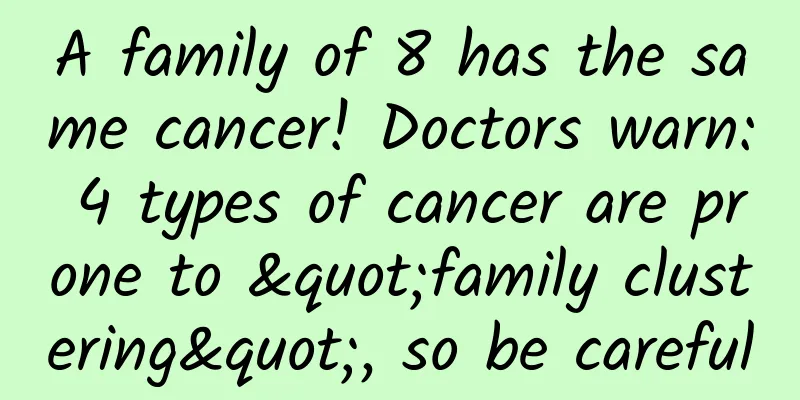A family of 8 has the same cancer! Doctors warn: 4 types of cancer are prone to "family clustering", so be careful

|
Recently, a piece of news about eight people in a family suffering from the same type of cancer has sparked heated discussions and concerns among netizens. In fact, this type of news is not uncommon. Some cancers have a strong family clustering tendency. If one person in a family has cancer, the whole family may need to get checked to detect it as early as possible and receive timely treatment. So, what are these family-clustering cancers? And how should we deal with them? Related report screenshots What causes a family to suffer from the same cancer? The phenomenon of a family suffering from the same cancer is called familial cancer. On the one hand, it may be because they have a common lifestyle, such as bad eating habits, smoking, etc. , but on the other hand, it may also be because they share the same defective genes , which may increase their risk of developing specific cancers. Genetic factors may be the main cause of this type of cancer. When we talk about genetic factors, we mean that family members have similar susceptibility to diseases due to similar defective genes. For example, BRCA1 and BRCA2 gene mutations are associated with a higher incidence of breast and ovarian cancer, while Lynch syndrome is associated with an increased incidence of colorectal cancer. This means that if a family member has a history of cancer, other members may carry the same defective gene and are more likely to develop the same cancer. Therefore, when we discover these characteristics, we need to take more targeted measures. Common familial cancers Almost all types of cancer have some degree of genetic tendency, but some cancers are more obvious because of their characteristics of clustering in families, so we need to pay special attention. Today we will talk about several common familial cancers to help everyone better understand and deal with them. 1 Breast and ovarian cancer There is a famous case about the familial clustering of breast cancer: In May 2013, the famous Hollywood movie star Angelina Jolie announced that she decided to have a preventive bilateral mastectomy because she carried the breast cancer susceptibility gene (BRCA) 1, which greatly increased her risk of breast cancer and ovarian cancer. Existing studies have found that approximately 10% to 20% of people have the breast cancer susceptibility genes BRCA1 and BRCA2, which significantly increase the risk of cancer and are one of the main causes of familial clustering of breast cancer and ovarian cancer. Copyrighted stock images, reprinting and using may cause copyright disputes Specifically, women who carry a BRCA1 mutation have an 85% chance of developing breast cancer in their lifetime, while for women who carry a BRCA2 mutation, the risk is between 40% and 45%. For ovarian cancer, the risk is estimated at 40% to 50% for BRCA1 mutations and 15% to 30% for BRCA2 mutations. In comparison, women who do not carry these specific gene mutations have an average lifetime risk of developing breast cancer and ovarian cancer of approximately 12.4% and 1.3%, respectively. Although some patients may be diagnosed early due to certain symptoms, breast cancer and ovarian cancer do not have specific symptoms in the early stages, and early detection through symptoms is unreliable. Therefore, it is more important to take the initiative to conduct regular screening , especially for people who carry the BRCA1/2 gene. It is recommended to have annual mammography (molybdenum target) and breast MRI (magnetic resonance imaging) examinations starting at the age of 25; starting at the age of 30 or 5 to 10 years before the earliest diagnosis of ovarian cancer in the family, a transvaginal ultrasound examination and serum CA-125 level test should be performed every 6 to 12 months for ovarian cancer screening. 2 Colorectal cancer The presence of certain types of gene mutations can significantly increase the risk of colorectal cancer in family members, and the age of onset of cancer will also be greatly advanced. This situation is usually caused by mutations in the mismatch repair (MMR) gene, and Lynch syndrome (LS) is a typical example. The lifetime risk of colorectal cancer in patients with Lynch syndrome is estimated to be between 50% and 80%, and the average age of onset of colorectal cancer associated with it is 45 to 60 years old. In comparison, the average age of onset of common sporadic colorectal cancer is about 69 years old. If a person's bowel habits are significantly different from usual, or if they are accompanied by weight loss or blood in the stool, these may be signs of colorectal cancer . Regardless of whether or not you have been diagnosed with cancer, you should see a doctor in time for a checkup to confirm the diagnosis. However, more proactive measures should be taken for people with high genetic risk. For example , genetic counseling is recommended for individuals suspected or diagnosed with Lynch syndrome , and germline mutation testing of MMR genes such as MLH1, MSH2, MSH6, and PMS2 is performed. It is very necessary for this group of people to undergo regular colonoscopy screening. Specifically, for LS patients with MLH1 and MSH2 gene mutations, it is recommended to undergo colonoscopy every 1 to 2 years starting from the age of 20 to 25 years; for LS patients with MSH6 and PMS2 gene mutations, it is recommended to undergo colonoscopy every 1 to 3 years starting from the age of 30 to 35 years. 3 Gastric cancer The causes of familial clustering of gastric cancer include genetic and environmental factors. In terms of genetic factors, mutations in the CDH1 gene are associated with hereditary diffuse gastric cancer. Studies have shown that among people carrying this gene mutation, the cumulative incidence of gastric cancer by the age of 80 is 70% for men and 56% for women. Environmental factors mainly include bad eating habits and lifestyles, including Helicobacter pylori infection, as well as frequent drinking and eating pickled and smoked foods, which can lead to family clustering . Studies have shown that individuals with a history of Helicobacter pylori infection have a risk of gastric cancer that is more than 20 times that of individuals without a history of infection. Copyrighted stock images, reprinting and using may cause copyright disputes Some gastric cancer patients may experience unexplained stomach discomfort and weight loss or anemia, which should be treated with high vigilance. However, since most symptoms are similar to those of common stomach diseases, judging gastric cancer based solely on symptoms may lead to unnecessary panic. For people with a family history of gastric cancer, it is particularly important to maintain the habit of regular gastric cancer screening. Specifically, high-risk people are recommended to undergo gastroscopy screening every 1 to 2 years between the ages of 45 and 75, and test for Helicobacter pylori infection every year, and perform corresponding eradication treatment when necessary. 4 Esophageal cancer The causes of familial clustering of esophageal cancer also include genetic and environmental factors. In terms of genetic factors, studies have found that people with a family history of esophageal cancer in their first-degree relatives have almost doubled (1.85 times) the risk of developing esophageal squamous cell carcinoma, and a small number of esophageal adenocarcinomas have also been found to be hereditary, but the specific genetic tendency is currently unknown. Environmental factors mainly involve certain bad eating habits and lifestyles. For example, hot drinks over 65 degrees Celsius have been listed as Class 2A carcinogens by the International Agency for Research on Cancer , which will increase the risk of esophageal cancer. In addition , smoking and drinking will also increase the risk of esophageal cancer . These are also important reasons for the familial incidence of esophageal cancer. Copyrighted stock images, reprinting and using may cause copyright disputes A common early symptom of esophageal cancer is a gradually worsening choking sensation when swallowing . This feeling sometimes manifests as food/water being retained in the esophagus. Because it occasionally eases, it is often ignored. If weight loss also occurs at the same time, you should be even more vigilant. However, many esophageal cancers have no symptoms in the early stages, so high-risk groups need to take the initiative to undergo regular screening. Specifically, high-risk groups should undergo endoscopic examinations every 5 years between the ages of 45 and 75; if intraepithelial neoplasia is found, the frequency should be adjusted to 1 to 3 years. How to deal with family-associated cancer When dealing with familial cancer, there is no need to panic. The key is to take the initiative to undergo regular screening, maintain a healthy lifestyle, and receive targeted genetic counseling. Specifically, the first thing is to take the initiative to find the corresponding specialist for regular screening ; secondly, you should be more conscious of maintaining a good lifestyle and eating habits , such as a balanced diet, regular exercise, quitting smoking and limiting alcohol, etc.; finally, targeted genetic counseling can provide personalized risk assessment and guidance , which can help family members develop more targeted prevention strategies. In short, through these three efforts, the risk of familial cancer can be most effectively managed and reduced. References [1]Hemminki K, Sundquist K, Sundquist J, et al. Familial Risks and Proportions Describing Population Landscape of Familial Cancer. Cancers (Basel). 2021;13(17):4385. [2]Jasperson KW, Tuohy TM, Neklason DW, et al. Hereditary and familial colon cancer. Gastroenterology. 2010;138(6):2044-2058. [3]Gambini D, Ferrero S, Kuhn E. Lynch Syndrome: From Carcinogenesis to Prevention Interventions. Cancers (Basel). 2022;14(17):4102. [4]Hansford S, Kaurah P, Li-Chang H, et al. Hereditary Diffuse Gastric Cancer Syndrome: CDH1 Mutations and Beyond [published correction appears in JAMA Oncol. 2015 Apr;1(1):110]. JAMA Oncol. 2015;1(1):23-32. [5] He Jie, Chen Wanqing, Li Zhaoshen, et al. Guidelines for screening, early diagnosis and early treatment of gastric cancer in China (2022, Beijing) [J]. Chinese Journal of Oncology, 2022, 44(07): 634-666. [6]Kikuchi S, Obata Y, Sasakabe T, Kawai S, et al. Relative risk of gastric cancer between those with and without Helicobacter pylori infection history in Japan. JGH Open. 2022;6(3):166-170. Chen T, [7]Cheng H, Chen X, et al. Family history of esophageal cancer increases the risk of esophageal squamous cell carcinoma. Sci Rep. 2015;5:16038. [8]van Nistelrooij AM, Dinjens WN, Wagner A, et al. Hereditary Factors in Esophageal Adenocarcinoma. Gastrointest Tumors. 2014;1(2):93-98. [9] He Jie, Chen Wanqing, Li Zhaoshen, et al. Guidelines for screening, early diagnosis and early treatment of esophageal cancer in China (2022, Beijing) [J]. Chinese Journal of Oncology, 2022, 44(6): 491-522. Planning and production Author: Jiang Yongyuan, Master of Internal Medicine, Third Military Medical University Review | Pan Zhanhe, Chief Physician, Master Supervisor, Department of Oncology, Zhongshan Hospital, Xiamen University Planning丨He Tong Editor: He Tong Proofread by Xu Lailinlin The cover image and the images in this article are from the copyright library Reprinting may lead to copyright disputes |
>>: Altay, a place you will regret visiting
Recommend
How to write a promotional plan and how to package it
1. What is a promotion plan? Before we know how t...
After four tests, how is iOS15.2 polished?
This is a very strange thing. For iPhone 12 and i...
How to choose the right advertising channel?
From the era of traditional stores, traffic was o...
How to write an SEO execution strategy? How do businesses implement SEO strategies?
The result of using strategies to guide the speci...
How do independent developers market their products? Overseas experts share 3 tips
[[152403]] Raghav Mathur is the chief marketing o...
3 key points for optimizing Google advertising!
The quality score of your ads plays a very import...
Cook's annual summary: Apple has achieved extraordinary results this year
According to US media reports, Apple CEO Tim Cook...
Can Tik Tok short videos be used for SEO?
When it comes to search, the first thing that com...
How to increase the activation rate of information flow advertising?
How to increase activation volume ? Similar quest...
Here are 13 thoughts on brand naming
I have written an article specifically on the iss...
App Store is frequently experiencing abnormalities. How can we use mainstream application promotion methods to “guard” the charts?
This article mainly includes two points: 1) Intro...
Android is in chaos, Apple is king
Do you have the same or similar feelings: The And...
Douyin analysis report: How does Douyin meet the needs of different users after its explosion in popularity?
As the number of users changes, Douyin ’s product...
The worst outcome for LeTV is that Jia Yueting loses control. How can the stock price collapse?
After writing the article, I suddenly realized th...
How to operate Douyin in Foshan (which one is the best)? The latest Douyin strategy
Although the best time to do Douyin was in the pa...









